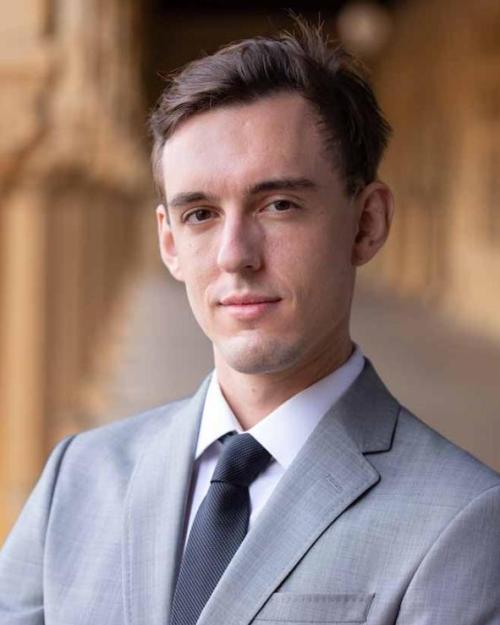When numerous people in Alejandro Martínez-Marquina’s hometown in Spain won a lottery game called El Gordo (The Fatty), he was fascinated by what his friends and neighbors did with winnings equivalent to $20,000 U.S.
Some chose to buy new cars, said Martínez-Marquina, a Klarman Fellow in economics in the College of Arts and Sciences. Others decided to pay off their home mortgages. Although he was in his second year of college, studying architecture, Martínez-Marquina found himself giving them financial advice.
“But you’re buying a cost!” he said to a person purchasing a new car requiring expensive maintenance and insurance. And to those paying mortgages, he asked “Why not invest the money in the stock market and pay off your mortgage with that, while earning more besides?”
His neighbors scoffed at his questions, telling the architecture student, “You’re such an economist.”
Their words proved prophetic. Unable to stop thinking about the choices people made with their finances, Martínez-Marquina began taking economics classes and by his third year had changed majors completely, going on to earn a Ph.D. in economics from Stanford University.
Now, Martínez-Marquina is a behavioral and experimental economist studying financial decisions. During his Klarman Fellowship, he is researching the mechanisms through which people make choices about money, especially when debt or uncertainty are present.
“There are many situations in which people make financial decisions where it goes against their best interest, and we don’t fully understand why,” he said. “In economics, this is called deviations from rational behavior. If people are not rational, what are they doing?”
Martínez-Marquina’s interest at the crux of behavior and economics fits very well at Cornell, often referred to as the birthplace of behavioral economics, said Ted O’Donoghue, Zubrow Professor of Economics, Martínez-Marquina’s faculty host.
“It’s a community where psychologists and economists interact in a way that doesn’t happen in many places,” O’Donoghue said. “The graduate students have benefitted immensely from Alejandro’s comments and suggestions. I’ve benefitted when I’ve talked with him about my research. Having him here has been fabulous. We’ve made each other’s work better. He’s just a great economist.”
One of Martínez-Marquina’s current projects looks at approaches to debt. He’s found through controlled studies online and in person that people in general are averse to borrowing money in order to invest.
“Even when they have a very clean investment scenario – I will give you 20 percent return, guaranteed, every two days, but to do that, you need to borrow at five percent interest – people don’t want to borrow money to invest, because they hate having debt so much,” he said.
This is important, he said, because many sound investments require financing through credit, such as buying a house, opening a business or going to college. And many institutions, such as corporate housing lenders and higher education, rely on borrowing money.
Martínez-Marquina also studies uncertainty and risk, which are related to questions of debt. For example, he said, imagine you have to buy a used car. whose quality you don’t and can’t know. To decide on the purchase, all you can do is consider the range of possible outcomes and decide based on what you think might happen. Economists call this contingent reasoning, which is crucial in decisions involving uncertainty.
“Almost every financial decision you make in your life involves uncertainty,” Martínez-Marquina said. Yet, “it’s hard to think about things that have not happened. Our brains have a hard time thinking about the hypothetical. In situations where this hypothetical is required, people really struggle.”
But while risk is a necessary part of many financial decisions, Martínez-Marquina has found through his experiments that people tend to dwell on the worst-case scenarios and therefore avoid risk.
Martínez-Marquina is also interested in preferences: why people do the things they do, and why they like the things they like. In particular, he’s studying gender roles and how women make decisions to work or stay home to care for families and the role of education in perpetuating gender roles.
To delve into why women stay home instead of working – a decision with economic ramifications – Martínez-Marquina studied decisions made by women in Spain in the 1970s.
During the Franco dictatorship, 1939 to 1977, teenaged girls had to go through a training program that relegated women to the roles of wives and mothers. This class was abolished in 1978; through a study of public records, Martínez-Marquina compares the decisions made by women who went through the program with those made by women who missed the program by only a year or two. He found that this indoctrination was effective and the effects were very persistent.
“Eight or nine years later, those who took the class got married younger, had kids younger, and they are more likely to be housewives,” he said.
The Klarman Fellowship has given Martínez-Marquina time and resources to study these questions within the Cornell Department of Economics.
“I cannot emphasize enough how amazing it has been to have a whole year where I have no outside commitments and enough funding to conduct more experiments,” he said.
In his own life, Martínez-Marquina can trace his rise as a top economics researcher back to his mother. One of the lucky winners in the El Gordo lottery, she saved her winnings, about $20,000, in case her son wanted to pursue a master’s degree.
“She invested this money in my education,” he said. “It has turned out to be a very good decision.”





